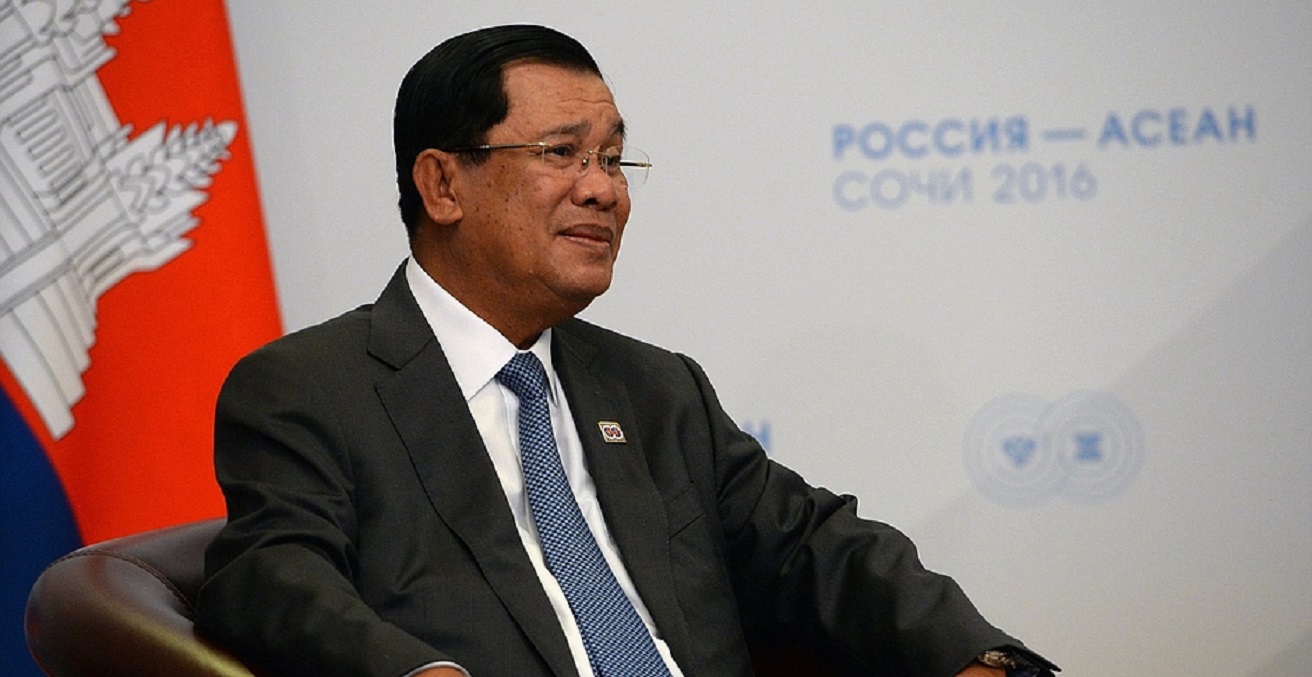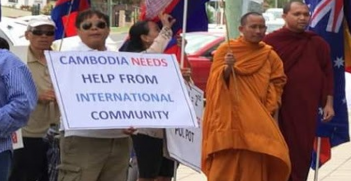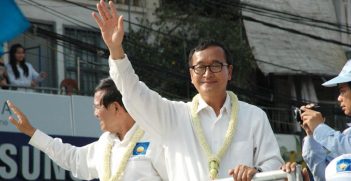The Politics of Survival and Cambodia’s Post-COVID-19 Foreign Policy

The politics of regime survival will continue to be the dominant force diving Cambodia’s foreign policy post-COVID-19. This will push Cambodia deeper into China’s orbit.
Cambodia’s foreign policy has been largely driven by the politics of regime survival. This trend will become stronger in post-pandemic Cambodia considering the concurrent impact of COVID-19, and the partial withdrawal of the European Union’s “Everything But Arms” (EBA) scheme on the country’s economy.
In recent years, Cambodia has edged towards authoritarianism with a clear trend. The country has received global media coverage for its close strategic alignment with China, ongoing crackdown on dissent, and a series of speculations that it is allowing China military access to a naval base in Sihanoukville province and other nearby ports. Cambodia has been criticised for its troubling tilt towards China, which has come at the expense of its relations with the West and countries in Southeast Asia. As small state with limited resources and power, Cambodia lacks the ability to pursue a balancing strategy in its foreign policy.
There have been ongoing arguments regarding Cambodia’s foreign policy strategy. Some have argued that Cambodia hedges rather than bandwagons completely with China. Others opine that Cambodia does not hedge, but softly bandwagons with Beijing by seeking close ties with China’s competitors, such as Vietnam and Japan. Still some argue that Cambodia, motivated by economic pragmatism, is increasingly leaning towards China and looks set to jump on Beijing’s bandwagon – at least China’s defence bandwagon.
Each argument has its own merits. However, considering recent domestic political developments, the growing great power competition for dominance in the Asia-Pacific, the United States and the EU’s sanctions, China’s increased Cambodia engagement, and the country’s economic fallout caused by COVID-19, Cambodia is seemingly shifting from a soft (or limited) to hard (or pure) bandwagoning policy in its relations with China.
The one compelling reason which explains Cambodia’s increased bandwagoning towards China is the politics of survival.
The politics of survival
In Cambodia, politics and regime survival take centre stage. Prime Minister Hun Sen has led Cambodia for more than 30 years. His war-peace rhetoric has appealed and continues to appeal mainly to older Cambodians who experienced firsthand the genocidal Khmer Rouge regime. However, such rhetoric seems to fall on deaf ears when it comes to Cambodian youth and those born after 1979 when the genocidal regime collapsed.
The fact that Hun Sen and his Cambodian People’s Party (CPP) have been in power for so long is clearly not well-received by the youth, who constitute about two-thirds of Cambodia’s 16.7 million population. The 2013 national elections, and especially the recent commune elections in 2017 in which more than 3 million Cambodians (43.8 percent) voted for the now-dissolved opposition party, speak volumes on how Cambodians want a leadership change in their country. In comparison, the CPP received about 3.5 million votes (50.8 percent) in 2017.
Hun Sen therefore needs a sustained level of legitimacy for him and his regime, despite the fact that his party won all 125 parliamentary seats in the last election, which was condemned as sham. Although Hun Sen has led Cambodia to full peace since 1998, one of his greatest political legacies, the socio-economic development has played a critical role in reinforcing his performance legitimacy.
Despite their dissatisfaction with many social issues such as corruption, nepotism, and patronage, many Cambodians welcome the rapid development taking place in the country. Although almost 3 million Cambodians sought leadership change in the 2013 national elections, many may just feel hopeless and hopeful at the same time now.
They are hopeless because a change in leadership or regime change is now impossible because the major opposition party, the Cambodia National Rescue Party (CNRP), was dissolved by the Supreme Court in 2017. Sam Rainsy, the former CNRP leader now in exile, has seemingly exhibited a lack of realistic political leadership strategies in the last few years, despite his political savviness and persistence and his attempts to return to Cambodia to effect change.
Until recently, Sam Rainsy has shifted his political strategy from an anti-Vietnam narrative to a strategy that falls on the line of an anti-China political rhetoric. These strategies are divisive. Worse still, Kem Sokha, the former co-leader of the CNRP and one of the very few opposition figures who has the capacity to compete with Hun Sen in the elections on fair terms, remains banned from politics and on trial for his alleged treason charges.
Meanwhile, many Cambodians may still be hopeful that Hun Sen’s regime will lead Cambodia to further development, prosperity, and peace. They pray that Hun Sen’s successor, potentially Lieutenant General Hun Manet, Hun Sen’s eldest son, will promote democracy and human rights, and continue to drive development in Cambodia.
The need to sustain economic development to enhance Hun Sen and his party’s legitimacy and to guarantee his regime’s survival could not be greater amid the COVID-19 pandemic, and will become even more so in post-pandemic Cambodia. Thus, once the pandemic eases, Hun Sen’s government will further embrace and lean towards China to continue to take advantage of the Chinese Belt and Road Initiative (BRI), which has so far brought increased investment to Cambodia and modernised parts of the country. This is an example of Cambodia’s foreign policy strategy, chiefly driven by economic pragmatism, which is akin to a bandwagoning policy towards China.
Also important to Cambodia’s bandwagoning policy are domestic political developments, grounded in the politics of regime survival. In a sense, regime survival, or politics of survival, comes first in explaining Cambodia’s current foreign policy. Cambodia is seen as descending into dictatorship, resulting in sanctions and criticism from the West, but not from China. The ultimate aim of this political move is to sustain regime survival. The dissolution of the only viable opposition party, the ongoing crackdown on dissenting voices, the passage of a controversial “state of emergency” law, and the growing friendliness towards China are elements of the politics of survival.
This survival politics, considered as a real threat to Cambodia’s dying democracy, puts the country on an authoritarian trajectory which may not reflect the interests of millions of Cambodian voters and the efforts of the international community to assist Cambodia in transitioning into a democracy since the early 1990s.
As Cambodia finds itself increasingly caught in the middle of the US–China strategic competition for regional influence, and as its economy continues to be severely impacted by COVID-19 as well as sanctions from the West, its post-COVID-19 foreign policy will further prioritise regime survival, potentially resulting in Cambodia’s complete bandwagoning with China.
In the midst of the COVID-19 crisis and Sino-American rivalry, putting all eggs in the Chinese basket – or appearing to be – is not a viable and sustainable foreign policy strategy for small states like Cambodia.
Kimkong Heng, a recipient of the Australia Awards Scholarship, is a PhD candidate at the University of Queensland. He is also a Visiting Senior Fellow at the Cambodian Institute for Cooperation and Peace and a founding co-editor of Cambodian Education Forum. All views expressed are his own.
This article is published under a Creative Commons License and may be republished with attribution.





